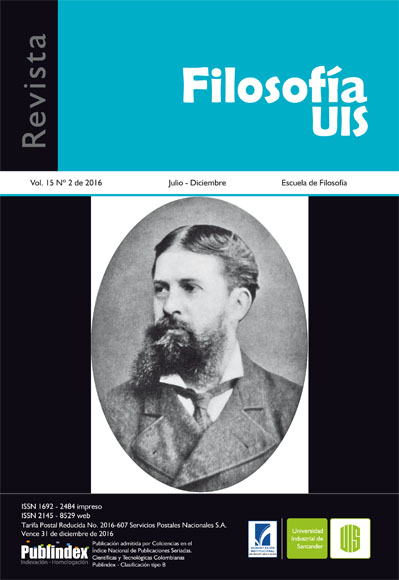Research Article
Deep ecology and global citizenship
Published 2016-11-30
Keywords
- globalization,
- global citizenship,
- deep ecology,
- extended self,
- responibility
How to Cite
Bula Caraballo, G. (2016). Deep ecology and global citizenship. Revista Filosofía UIS, 15(2), 55–71. https://doi.org/10.18273/revfil.v15n2-2016003
Copyright (c) 2016 Revista Filosofía UIS

This work is licensed under a Creative Commons Attribution 4.0 International License.
Abstract
Thinkers such as Ulrich Beck or Peter Sloterdijk argue that the world is compact (that is, that in it action does not escape global systemic consequences). From this basis, I argue for the necessity of global citizenship, that is, of civilian political activism that transcends national boundaries. Bearing in my mind the difficulties to global citizenship outlined by Orion Kriegman, I propose that the idea of extended self, taken from Arne Naess’ Deep Ecology, can provide a basis for overcoming said difficulties.Downloads
Download data is not yet available.
References
- Alcott, B. (2005). “Jevon’s paradox”. Ecological Economics, 54 (1), 9-21.
- Ali, A. (1999). “Climate Change Impacts and Adaptation Assessment in Bangladesh”. Climate Research, 12, 109-116.
- Beck, U. (1986, 2006). La sociedad del riesgo: hacia una nueva modernidad. Barcelona: Paidós.
- Beck, U. (2009). “Critical Theory of World Risk Society: A Cosmopolitan Vision”. Constellations, 16 (1), 3-22.
- Boersema, J. (2002). “Why is Saint Francis Assisi the patron saint of ecologists?”. Science and Christian belief, 14 (1), 51-77.
- Bula, G. (2010a). “Diversidad y cohesión”. Polisemia, año 7 (10), 53-61.
- Bula, G. (2010b). “Las conexiones ocultas”. Polis. Revista Latinoamericana, 25, 1-13. Calhoun, C. (2013). “Occupy Wall Street in perspective”.
- British Journal of Sociology, 64 (1), 26-38. De Certeau, M. (1990, 2000). La invención de lo cotidiano I: artes de hacer.
- México: Universidad Iberoamericana.
- Drengson, A.; Devall, B. y Schroll, M. (2011). “The Deep Ecology Movement: Origins, Development and Future Prospects Towards a Transpersonal Ecosophy”. International Journal of Transpersonal Studies, 30 (1-2), 101-117.
- Flores, F. ; Spinosa, Ch. y Dreyfus, H. (1997, 2000). Abrir nuevos mundos: iniciativa empresarial, acción democrática y solidaridad. Buenos Aires: Taurus.
- Jancaitis, K. (2008). “Florida on the Coast of Climate Change: Responding to Rising Seas”. Environmental Policy and Law, 31 (2), (157-194).
- Kriegman, O. (2006). Dawn of the Cosmopolitan, the Hope of a Global Citizens
- Movement. Boston M.A.: Tellus Institute.Leibinz, G.W. (1714, 1983). Monadología. Discurso de Metafísica. Profesión de fe
- del filósofo. Madrid: Orbis.
- Leonard, A. (2010). La Historia de las Cosas. Madrid: Fondo de Cultura Económica.
- Naess, A. (1973). “The Shallow and the Deep, Long-Range Ecology Movement: A Summary”. Inquiry, 16, 95-100.
- Naess, A. (2008). Ecology of wisdom. Berkeley C.A.: Counterpoint.
- Ostling, R. (2007). Mormon America. Nueva York N.Y.: Harper One.
- Rocca, A. (2009). “Sloterdijk y el imaginario de la Globalización; mundo sincrónico y conciertos de transferencia”. Aisthesis, (45), 167-180.
- Singer, P. (2002, 2003). Un solo mundo. Barcelona: Paidós.
- Singer, P. (2009). Animal Liberation. Nueva York: Harper Perennial.
- Sloterdijk, P. (2005, 2007). En el mundo interior del capital. Madrid: Siruela.
- Sloterdijk, P. (1999/2004). Esferas II. Globos. Macroesferología. Madrid: Siruela.
- Velez de Cea, A. (2013). “The Dalai Lama and the Nature of Buddhist Ethics”. Journal of Buddhist Ethics, 20, 500-540.
